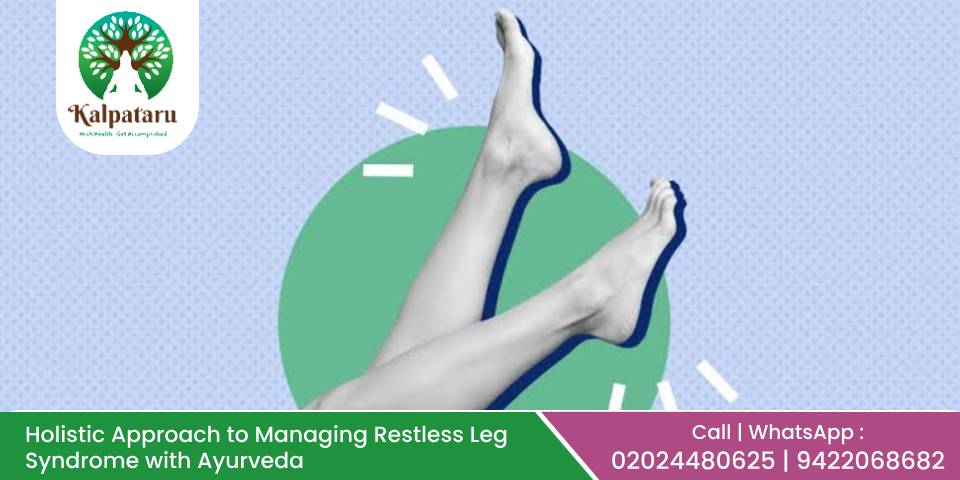Restless Leg Syndrome (RLS) can disrupt sleep and affect the quality of life for those who experience it. While conventional treatments may involve medications with potential side effects, Ayurveda offers a holistic approach to managing RLS naturally. In this blog, we’ll explore Ayurvedic principles and remedies for alleviating the symptoms of RLS and promoting overall well-being.
Understanding Restless Leg Syndrome from an Ayurvedic Perspective:
In Ayurveda, Restless Leg Syndrome can be compared to the concept of Pindikodweshtan, where the aggravated Vata dosha imbalance disrupts the proper functioning of muscles and nerves, leading to disturbing movements and discomfort in the legs. This imbalance can be triggered by various factors, including stress, poor dietary habits, and irregular daily routines. When Vata dosha is aggravated, it can manifest as symptoms like restlessness, twitching sensations, and difficulty in relaxing, all of which are characteristic of RLS.
Ayurvedic Management Strategies:
- Balancing Vata Dosha: Adopting a Vata-pacifying diet: Focus on warm, cooked foods that are nourishing and grounding, such as soups, stews, whole grains, and cooked vegetables. Avoid cold, dry, and processed foods, as they can aggravate Vata.
- Regular daily routine: Establishing a consistent daily schedule can help regulate Vata dosha. Aim to wake up and go to bed at the same time each day, and incorporate relaxation practices like meditation and gentle yoga into your routine.
- Herbal remedies: Ayurvedic herbs such as Ashwagandha, Brahmi, Shatavari and kalpas like Madhumaalini Vasant are known for their calming and nerve-strengthening properties. These herbs and formulations can help soothe the nervous system and alleviate symptoms of RLS when taken under the guidance of an Ayurvedic practitioner.
- Ayurvedic Therapies: Abhyanga (Ayurvedic Oil Massage): Regular self-massage with warm sesame oil or some siddha oils like sahachar tel, mashsaindhav oil can help pacify Vata dosha and promote relaxation. Focus on massaging the legs gently, paying attention to areas where you experience discomfort or tension.
- Panchakarma Therapy: Detoxification and rejuvenation treatments such as Shirodhara (warm oil pouring on the forehead) and Basti (medicated enema) can help balance Vata dosha and promote relaxation.
- Lifestyle Modifications: Avoiding addictive habits and excessive standing or sitting: Individuals with RLS should refrain from indulging in any addictive habits like smoking and tobacco and avoid standing for long periods or sitting in one place for too long, as these behaviors can worsen the condition.
- Moderate exercise: Engaging in moderate exercise can help alleviate symptoms of RLS. However, excessive or intense cardio or weight training exercises should be avoided as they can exacerbate leg pain. Some specific yogic postures such as Vajrasan , Sarwangasan are helpful to minimise pains and discomfort
- Elevating legs and gentle massage: Elevating the legs with a pillow before sleep and gently massaging them for five to ten minutes can provide relief from RLS symptoms.
- Nutritional Considerations: Balanced diet: Consuming a nutritious diet is essential for managing RLS. Ensure you are getting adequate vitamins and minerals through your diet, or consider supplements if deficiencies are present.
Conclusion:
Restless Leg Syndrome can significantly impact the quality of life, but Ayurveda offers a gentle and holistic approach to managing this condition. By addressing the underlying imbalances in the body and mind through diet, lifestyle modifications, and Ayurvedic therapies, individuals can find relief from RLS symptoms and experience greater overall well-being. However, it’s crucial to consult with a qualified Ayurvedic practitioner before beginning any new treatment regimen to ensure personalized and effective care. With patience and dedication, Ayurveda can offer a path to restoring harmony and tranquility to the restless legs and the entire being.

